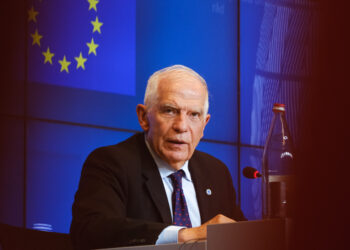Brussels – The EU High Representative for Foreign Affairs, Josep Borrell, will propose that member countries suspend political dialogue with Israel. A move that gives an idea of how much trust between the two partners has broken down in light of Tel Aviv’s repeated violations of international law in the war in Gaza and Lebanon. A political legacy on the part of the EU diplomacy chief, who has come to the end of his term, but one that is unlikely to be seized upon by the 27: for any amendment to the Association Agreement that governs EU-Israel relations, the rule of unanimity is required.
The initiative, announced yesterday (Nov. 13) to the ambassadors of EU countries, will be formalized on Monday, Nov. 18, at the Foreign Affairs Council. In all likelihood, the last one convened by Borrell before he leaves the leadership of the European External Action Service (EEAS) to Estonian Kaja Kallas. It is a proposal that is already off to an uphill start: according to diplomatic sources, at the meeting of permanent representatives most of the countries that spoke “expressed their opposition”.
In essence, as EEAS spokesman Peter Stano explained, Borrell will ask the foreign ministers of the 27 “to assess whether there is indeed a violation of human rights (by Tel Aviv, ed), as provided for in Article 2 of the EU-Israel Association Agreement, and to consider any EU decisions or measures.” The EU High Representative had already announced last month that he wanted to overcome the impasse that arose from Israel’s refusal to convene an Association Council with Brussels in which to discuss respect for human rights in the Middle East conflict. “Member states wanted to discuss it first directly with Israel within the Association Council, but in last month’s discussions, it became clear that it will not be held soon.”
On that occasion, Borrell had stated that “humanitarian law is buried under the rubble of Gaza.” In light of this, the High Representative has already made his proposal: suspend the chapter on political dialogue under the EU-Israel Association Agreement. A symbolic move, not exactly what Spain and Ireland have been asking for months, namely to revise the Association Agreement in its entirety, in order to leverage Israel economically as well by suspending the trade facilitation parts.
In the document governing relations between Brussels and Tel Aviv, political dialogue constitutes the first of nine chapters and consists of only three articles, from 3 to 5. The first states that “regular political dialogue shall be established between the Parties” to “develop better mutual understanding and increasing convergence of positions on international issues” and to “strengthen regional security and stability.” Article 4 argues that such dialogue shall tend to the “common objectives, in particular peace, security and democracy.” The last one lists how the dialogue is to be conducted: at the ministerial level, of senior officials, “providing regular information to Israel on matters related to the Common Foreign and Security Policy, which will be reciprocated,” and at the level of Parliaments, between the EU Parliament and the Knesset.
English version by the Translation Service of Withub







